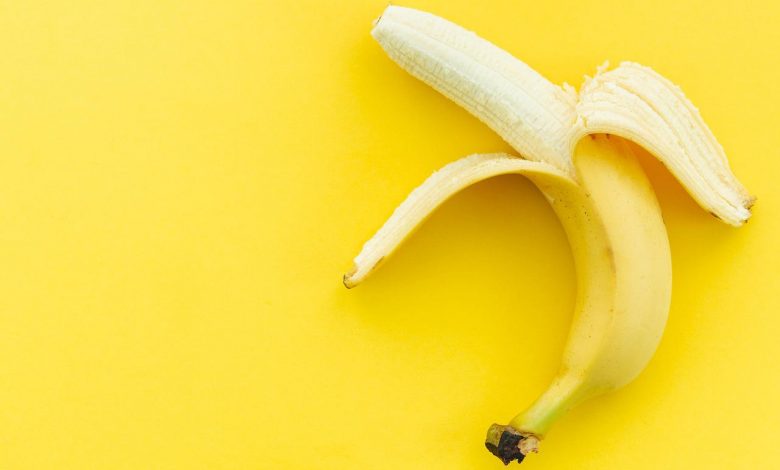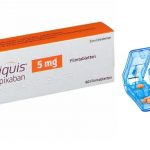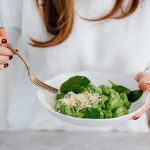Can I Eat Bananas While Taking Eliquis (Apixaban)?

Bananas are most commonly known for being a good source of potassium, but as per the U.S. Department of Agriculture’s MyPlate guidelines, their nutritional worth doesn’t end there. In fact, this fruit is packed with a plethora of vitamins and minerals that are essential to your health, making them one of the world’s most appealing superfoods.
According to U.S. Department of Agriculture (USDA) calculations, which are based on a 2,000-calorie diet, a medium-size banana contains only 105 calories. Although it seems obvious that these fruits are a relatively healthy snack, they get a bad reputation because of the large amount of carbohydrates they have: 27 grams (g) for a medium-sized banana.
Bananas are a great food to eat when you’re sick. They’re soft and bland but rich in nutrients and fast-acting carbs. The potassium in bananas can help replenish your electrolyte stores as well, since potassium is one of the key electrolytes your body needs.
What is eliquis used for?
Eliquis is a brand-name prescription drug containing the active ingredient drug apixaban. It’s FDA-approved to treat and prevent dangerous blood clots that can block blood vessels in your body. It’s also called an anticoagulant. The process of blood clotting is called coagulation. Anticoagulants such as Eliquis make your blood less able to form clots.
Specifically, Eliquis is approved for use in adults to:
• Prevent blood clots and stroke in people with nonvalvular atrial fibrillation (AFib). Nonvalvular AFib is a type of irregular heartbeat that’s not caused by a heart valve problem. With this condition, you have a raised risk of blood clots forming in your heart.
• Treat deep vein thrombosis (DVT). A DVT is a blood clot that forms in a vein deep inside your body. DVTs most commonly occur in a vein in your leg, but they can also occur in your arm.
• Treat pulmonary embolism (PE). A PE is a blood clot that blocks blood flow to your lungs. It usually occurs when a DVT gets dislodged and travels through your veins to your lungs.
• Prevent DVT or PE from recurring. After you’ve had initial treatment for a DVT or PE, Eliquis helps prevent blood clots from occurring again.
• Prevent DVT that could lead to PE in people who’ve had hip or knee replacement surgery. These surgeries raise your risk of getting these types of blood clots.
Eliquis comes as a tablet that you take by mouth. It’s available in two strengths: 2.5 milligrams (mg) and 5mg.
Can I eat bananas while taking Eliquis (apixaban)?
According to the UK NHS, there are no foods or drinks you need to avoid while taking Eliquis. In fact, because Eliquis may cause bleedings which could possibly lead to anemia (a low blood cell count which may cause tiredness or paleness), eating bananas while taking this medication can be beneficial. Banana has a high enough iron content that is suitable for people with anemia. It stimulates the production of hemoglobin in the blood. Along with iron, it also makes for a good source of folic acid which is a B-complex vitamin that is required to make red blood cells. Consuming 2 bananas (±100g), every day routinely can overcome the deficiency of red blood cells or anemia.
However, there are certain foods and beverages that you may need to avoid or limit while taking Eliquis (apixaban) as they can interfere with the medication’s effectiveness or increase your risk of bleeding. Some of these foods and beverages include:
1. Alcohol: Drinking alcohol can increase the risk of bleeding while taking Eliquis. It is recommended to limit alcohol consumption while taking this medication.
2. Grapefruit and grapefruit juice: Grapefruit and grapefruit juice can interfere with the breakdown of certain medications, including Eliquis, which can lead to increased levels of the medication in the body. It is recommended to avoid grapefruit and grapefruit juice while taking Eliquis.
3. Green leafy vegetables: Green leafy vegetables, such as spinach and kale, are high in vitamin K, which can counteract the blood-thinning effects of Eliquis. It is recommended to eat a consistent amount of vitamin K-rich foods while taking Eliquis and to talk to your doctor or pharmacist about any necessary dietary adjustments.
4. Cranberry juice: Cranberry juice can increase the risk of bleeding while taking Eliquis. It is recommended to limit cranberry juice consumption while taking this medication.
5. Supplements: Certain dietary supplements, such as fish oil and ginkgo biloba, can increase the risk of bleeding while taking Eliquis. It is recommended to talk to your doctor or pharmacist about any supplements you are taking and to avoid or limit those that may increase the risk of bleeding.
It’s important to note that this list is not exhaustive and that there may be other foods, beverages, or supplements that can interact with Eliquis. Always consult with your doctor or pharmacist before making any changes to your diet or medication regimen.
What are the other side effects I may experience while taking Eliquis?
The most commonly reported side effect of Eliquis is bleeding. In clinical trials, major bleeding occurred in 327 (2.13%) out of 9,088 patients with nonvalvular atrial fibrillation, according to the prescribing information.
Tell your doctor about any side effects you experience, especially if they don’t go away or are bothersome.
Common Eliquis side effects include:
• Bleeding from cuts that take longer to stop
• Bleeding from nose or gums
• Easy bruising
• Excessively heavy menstrual bleeding
• Minor bleeding
• Nausea
If any of the above side effects become severe or cannot be stopped or controlled, contact your doctor right away or seek emergency medical attention.





